The Begining of ELGA
History > Time Lapse History
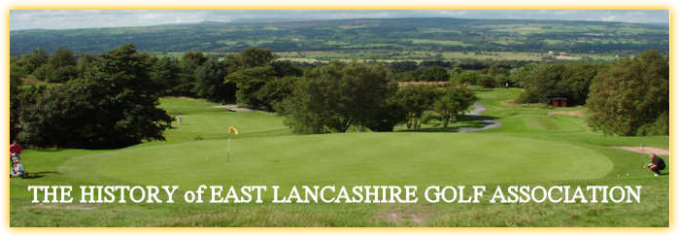
CENTENARY PRESIDENT - 2007
FRANK WHARTON
(Shaw Hill Golf Club)
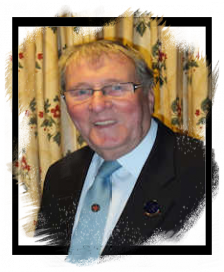
FOUNDER and FIRST PRESIDENT1907
FRANK H. WILLIAMSON
(Rossendale Golf Club)
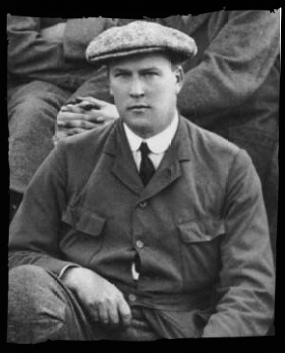
THE FORMATIVE YEARS. 1907 - 1914
On the 8th March 1907 a meeting took place at the Commercial Hotel,
Accrington, in response to a circular letter sent to all East Lancashire clubs by
Mr Frank H. Williamson, of Rossendale Golf Club, suggesting "that an association be formed, to hold a mutual competition annually.
Mr A. Drew (Burnley) presided over the meeting attended by representatives of Accrington, Burnley (Hapton), Burnley (Glen View), Blackburn, Colne, Rossendale and Wilpshire golf clubs. The resolution passed was that "an association be formed". In addition to the above clubs, Darwen, Great Harwood and Pleasington were invited to join.
Mr Harold M. Kenyon (Rossendale) was elected the Honorary Secretary.
All clubs were asked to report to their respective councils with the ideas discussed and report back at the same time and place on 21st March.
Mr A. Drew once again chaired the meeting and the following clubs signified their intentions to join what was initially known as 'The North East Lancashire Golf Association' ; Accrington, Burnley (Hapton), Burnley (Glen View), Blackburn, Colne, Great Harwood, Pleasington, Rossendale and Wilpshire.
Wilpshire Golf Club invited the Association to host its first competition on their links on Saturday 22nd June 1907. The invitation was accepted and approved. The first year's subscription was set at three guineas with each succeeding year being one guinea.
The ELGA committee would consist of the captains and one representative from each of the member clubs, with the captain of the club, hosting the Championship,being the chairman for that year.
The Championship was to be a club team scratch event, with four players representing each club, played over eighteen holes. The winner would be the team returning the lowest aggregate score who would hold the trophy (a shield to the value of not more than £20) for one year. A prize of five guineas would be given to the player returning the best scratch score along with a trophy to be held by his club.
At a meeting held on 30th May, Nelson Golf Club (Kibble Bank - 9 holes), foundedin 1902, was elected to membership of the Association.
Ten clubs competed in the inaugural Scratch Team Championship at Wilpshire Golf Club on Saturday 22nd June 1907.
The winning team was Blackburn with an aggregate score of 379, thirteen strokes better than Accrington and twenty-five strokes ahead of Burnley (Hapton) and the host club, Wilpshire. The best individual score, 92, was returned by W.V. Manley, of Pleasington.
In November 1907, Accrington received an order to vacate their Coppice course and moved to their present Aspin Valley site on 22nd August 1908.
The second Scratch Team Championship was held at Burnley (Hapton) on Saturday 27th June 1908, when the 'home' team succeeded in winning the Shield with an aggregate score of 341, just one stroke better than the Blackburn team whose J.J. Whalley won the individual prize with a score of 80.
In 1909, the position of Association Honorary Secretary/Treasurer was taken over by the respective Honorary Secretary of the club hosting the Championship. Only two meetings were held each year, in March and in May, mainly concerning the Scratch Team Championship and the rules appertaining to it.
BLACKBURN G.C. ~ FIRST ELGA SHIELD WINNERS ~ 1907
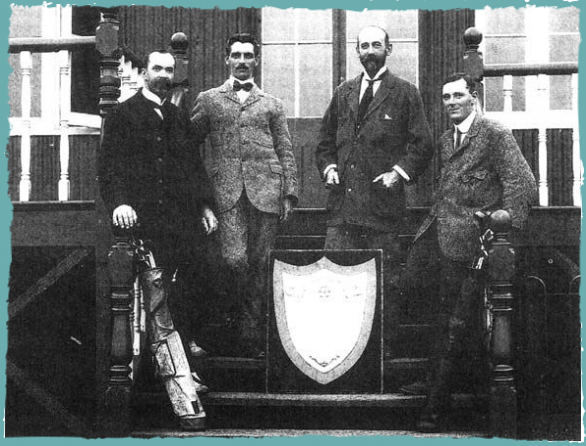
J. Ward, A. Shutt, J.J. Whalley, T.T. Mercer.
Ten teams competed for the Shield in 1909, this time at Pleasington on the 26th June, and once again success going in favour of the 'home' club. Pleasington's score of 322 was assisted by the best individual score of 76 returned by A. Critchley who tied with Blackburn's J.J. Whalley. Critchley winning the ninehole play off with a score of 38 against Whalley's 42. Pleasington's winning score was eleven strokes better than the 333 of second placed Burnley (Glen View).
The value of the individual scratch prize was reduced to three guineas with the player purchasing a suitable memento for which the Association would pay the bill when presented.
On 25th June 1910, the third annual Scratch Team Championship was held at Colne. For this event, and for the first recorded time, the local rules were checked and adopted by the ELGA committee. The 'home' team advantage was overcome by Pleasington with a winning score of 330, and W.J. Crabtree, of Burnley, won the individual prize with a 79.
In 1911, W.V. Manley, of Pleasington, became ELGA's first Lancashire player, making two appearances for the county during the year.
An Association meeting, held on 4th April 1912, agreed a recommendation that all Captains and Honorary Secretaries of member clubs be made Honorary members of all the clubs other than their own. A form of courtesy that has since become an almost nationally accepted situation. Accrington, however, did not accept the recommendation and Pleasington did not reply to the letter circulated by June 7th.
The whole matter was dropped at a meeting held on 26th February 1913. At the same meeting Burnley (Hapton) withdrew their membership of the Association.
Accrington was the venue for the 1912 Championship held on 13th July. Burnley (Glen View) did not compete reducing the number of teams to ten. Blackburn retained the Shield, with a score of 345, beating the 'home' side by ten strokes.
Blackburn's J.J. Whalley won the individual prize for the second time with a score of 82.
Nelson Golf Club were obviously very honoured to be invited to host the 1913 Association Championship, to be held on 21st June. The club was determined to put on a 'good show' and agreed, that in order to accommodate the ELGA officials, guests, club team players and caddies, a floored marquee would be erected and the catering would be let out to a Mr Edmunds, of Preston, at 2/6d per head, the cost to be met by the club.
The walls of the smoke room and the ladies' room were to be distempered and the ceilings 'done up' and restored to their original condition. It was arranged with Mr Waterworth, the club's landlord at Kibble Bank Farm, that the grazing on the course should be controlled until after the day of the competition. Two large truck loads of sea sand were purchased at a cost of 16/- for the replenishment of the bunkers and an extra green keeper was engaged for the month of June.
Pleasington, with a score of 338, won the Shield for the third time in seven years, beating Accrington by one stroke with Accrington's H.J. Ainsworth winning the individual prize with a score of 77. The last Association Scratch Championship held before the outbreak of the Great War was in 1914, at Darwen, whenWilpshire tied with Blackburn on a score of 337. J.J. Whalley, of Blackburn, won his third scratch medal with a score of 80.
PROGRESSIVE YEARS 1914 - 1939
In 1914 Clitheroe and Whalley Golf Clubs were invited to join the Association but declined. This was followed, in 1915, by an invitation to Turton Golf Club which also was declined.
Due to hostilities in Europe, meetings and competitions were suspended until 4th March 1919, when invitations to join the Association were sent to Baxenden, Clitheroe, Colne St. Andrews, Enfield, Hapton and Whalley. Baxenden, Clitheroe, Colne St. Andrews and Whalley were accepted into membership without entrance fee at a subscription of £1 per annum.
By the 1920 AGM the previous recommendation of Honorary Membership of all clubs for captains and secretaries was accepted. It was reported to the meeting that Great Harwood, having been disbanded, had withdrawn from the Association, and Enfield Golf Club was elected to membership on payment of the entrance fee. The first executive committee was formed in 1920 from :- Messrs Brothers (Pleasington), Boddy (Blackburn), Pilling (Colne), Rowland (Accrington), Ryden (Wilpshire) and a representative from the club hosting the Championship.
The executive's first task was to formulate a set of rules for the Association. The executive considered a suggestion from a Mr Folley, of Colne, that the Association should look into the standardisation of the bogey and par of each course. After enquiries had been made to the Midland Golf Union, information was received from the R&A that they were looking into this matter and so it was decided to defer any decision until the R&A's proposals had been received. (Their proposals were eventually received in February 1921). The rules of the Association were completed after viewing those of the Midland Golf Union and the Yorkshire Union of Golf Clubs.
Rossendale, who had been invited to host the 1920 championship, announced their intentions to invite the competitors to lunch or tea with the captain and promised to grant courtesy to them for practice on the course up to three weeks prior to the date of the event. At a committee meeting, held in March 1920, it was agreed " that any rule passed by the R&A be adopted by the Association for purpose of the Annual Competition". At the same meeting Bacup Golf Club was elected to membership and for the first time, the Association elected a President and a vice-President.
The first elected President was Mr Frank H. Williamson, of Rossendale, the instigator of the Association who, in 1906, had written to all the clubs in the area with the suggestion of forming an association.
Mr Malam Brothers, a past-captain and founder member of Wilpshire Golf Club and the current Honorary Secretary and a past-captain of Pleasington Golf Club, was elected vice-president.
By May, a draft copy of a year book had been submitted by the secretary and 60 copies were ordered at £18-15s and in addition 300 copies of the rules pages at £1-15s.
In November 1920, Harold Ryden submitted designs for a scratch medal, one was accepted and the same design is still used to this day.
The Association's first Extra-Ordinary General Meeting was called for 30th November 1921, when the executive agreed to hold a handicap competition. (The first took place at Wilpshire Golf Club in September 1922). It was agreed that the executive be empowered to fix the Scratch Score of each club's course in consultation with the green's committee and experienced players from each club.
Three systems were considered for arriving at the scratch score of a course,
The Yorkshire system:- length of course divided by 150 plus 36,
Northumberland's system:- length divided by 260 plus 54
and The Royal and Ancient's recommendation:- par score plus any number up to six according to the difficulties of the course.
The R&A system was adopted and it was decided that four committee members and two experienced players would visit each club.
The team of 'experienced' players chosen to accompany the executive members on their visits were :-
F. Lancaster and A. Lightfoof of Accrington
E. M. Jones and J.Ward of Blackburn
B. Hartley of Colne
A.C. Broadbent of Clitheroe
W. Landless and D. Buchanan of Nelson
H.F. Cunliffe and J.W. Bracewell of Rossendale
B. Marwood and G. Marwood of Pleasington
and H. Nuttal and T.C. Rutherford of Wilpshire.
The team, usually comprising 3 or 4 players and sometimes as many as six executive members, visited fifteen clubs and making sixteen assessments, between 19th April and 15th July of 1922, two in 1923, one in 1924 and one in 1926. The programme of assessments was a tremendous task, taking up much of the committee's and player's time over a relatively short period.
Following the 1922 assessments the secretary notified the August executive meeting that he had received a letter from the R&A who had approved the scratch scores and notified the secretaries of the relevant clubs. Mr Ryden questioned the meaning of the letter's last paragraph, which said, 'I am to express the hope that you will now proceed to handicap your members accordingly'. The ELGA executive then decided to make the following recommendation with a view to uniformity of procedure in handicapping :- 'That the handicap of any player returning a competition score under that of the scratch score of the course should be automatically lowered by the difference between his competition score and the scratch score until such time as the handicap committee of his club consider his handicap'.
In October 1922, Great Harwood Golf Club was re-admitted to the association without entrance fee. In the same month, a match took place at Nelson Golf Club between an ELGA team and the Lancashire Union of Golf Clubs.
The ELGA team selected from :-
H. Nuttall (Wilpshire), G. Marwood (Pleasington),
A. Lightfoot (Accrington), J. Horrocks (Accrington),
W.M. Landless (Nelson), G.C. Rutherford (Wilpshire),
S. Horne (Whalley), E.M. Jones (Blackburn),
B. Hartley (Colne), R. Worswick (Rossendale),
G. Marwood (Pleasington) and F. Broadbent (Blackburn),
halved the morning singles 5 all, but lost the afternoon foursomes 3 to 1, losing the match by 8 games to 6.
Great Harwood's application for re-election and Green Haworth's application for membership were confirmed and approved by the AGM of March 1923.
During the twenties, several meetings took place between Associations, County Unions and national bodies concerning the rapidly expanding number of golf clubs and the popularity of the game.
In 1924 it was suggested that an English Golf Union be formed, The Lancashire Union made suggestions that inter-sectional matches could take place and the R&A formed an National Joint Advisory Committee to co-operate in all matters relating to the control of the game. Following the setting up of that Advisory Committee, ELGA recommended to each club's handicapping committee, 'that in
October of each year, they make to this Association a return of all the competition
scores during the year of players with handicaps of five or under; and further of all competition net scores, (net, equal to scratch or under), of all players of the club'. This was adhered to and returns were scrutinised for 2 years giving better guidance to the association as to the accuracy of the existing scratch score of each club.
Pendle Forest became the latest member of the Association at the 1924 AGM and, in 1925, Hapton Golf Club, one of the founding clubs, applied for re-admission into the Association after a break of thirteen years.
During 1925 and 1926, all the Association's courses were once again subjected to scratch score assessments and in order to cope with this extra work-load the executive committee increased its membership to six.
From 1921 onwards most of the courses in East Lancashire were being improved. Pleasington and Wipshire were reconstructed, Accrington increased from 9 holes to 18 holes, with a complete reconstruction, and Darwen increased from a 12- hole course to 18. Great Harwood, Nelson and Burnley all had new courses and Blackburn and Rossendale made many changes and improvements. Preston Golf Club was admitted to the Association in 1927, bringing the number of member clubs to 20.
In 1928, the Association celebrated 21 years of existence by holding a competition and dinner at Wilpshire, the venue of the first competition, for the inaugural competitors and officials.
Rishton Golf Club joined the Association in 1929, having been founded in 1928, and Chorley Golf Club applied and was elected in the same year. Chorley participated in the 1929 Scratch Shield competition, did not enter the event in 1930 and withdrew from the Association in 1931to join the newly formed
Bolton Golf Association.
The vice-president, Malam Brothers, of Pleasington, a stalwart of the Association, died in 1930 and R.S. Pilling, of Colne, was elected to the vacant office but held it for only one year after which he was elevated to President when Frank Williamson, having been the Association's first President, holding the office since 1920, resigned in 1931 on leaving the district. Mr Williamson's parting gift to the Association was
a brass and oak wall clock, named the Williamson Trophy, as the prize for the best score on handicap for teams competing in the Scratch Shield competition. The clock, which now hangs proudly in the Rossendale clubhouse, was played for until 1959 and then given back to Rossendale Golf Club. From 1960 onwards the team handicap prize in the Scratch Shield competition became the President's Trophy.
In 1932 at Pleasington, an ELGA team was victorious, by 10 games to 8 over a team representing the newly formed Bolton Golf Association.
On the 14th July 1932, Clitheroe Golf Club opened their new clubhouse and 18- hole course at Barrow Gardens, Clitheroe, after being on land at Horrocksford Hall since 1905.
The Lancashire Championship of 1935, produced its first East Lancashire golfer as Champion, when Leslie Halliwell, of Darwen, beat Arnold Bentley, of Hesketh, at Fleetwood.
PLEASINGTON G.C. ~ ELGA SHIELD WINNERS ~ 1927, 1928, 1929, 1930
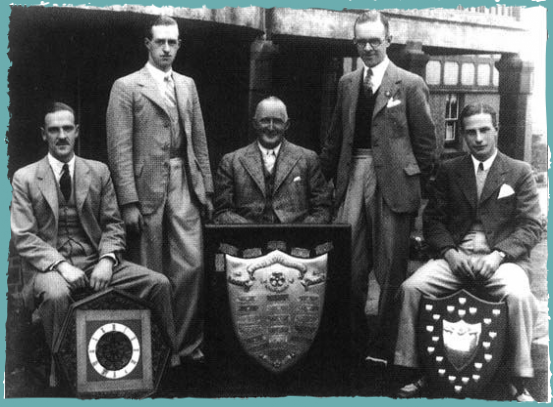
N. Fletcher, G. Marwood, H.M. Naylor, Geo. Taylor.
1935 was a momentous year for Burnley Golf Club. The Glen View Club won all three ELGA team championships and the Individual Scratch Medal during the season.
They won the Handicap Team Competition at Wilpshire, the Scratch Shield, at Accrington, with Harry Eatough winning the Individual Scratch Medal with his score of 74. Their scratch team also had the best net score returned which won the Williamson Trophy.
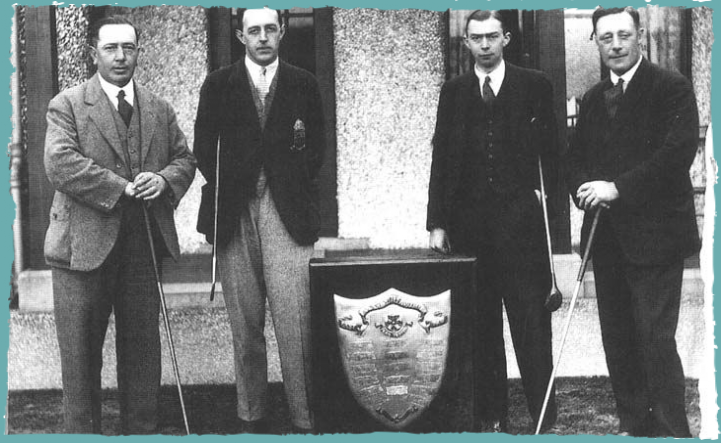
BURNLEY G.C. - ELGA SHIELD WINNERS 1935
J.A.Collinge,R.A. Dickenson, A.E.Naylor (Capt), J Butterfield, H Eatough.
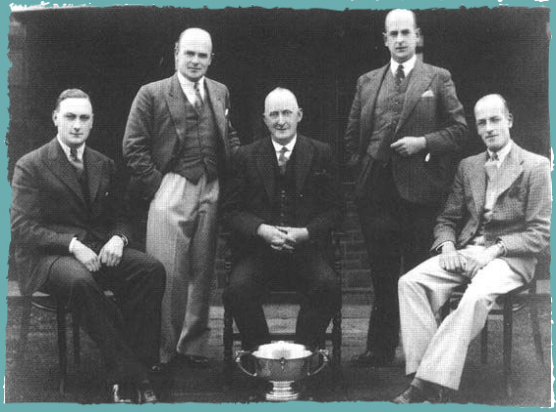
BURNLEY G.C.~ ELGA HANDICAP TROPHY WINNERS~ 1935
G.R. Hesketh, H.Y.Thompson, A.E.Naylor (Capt), D Race, J.C. Walton
THE POST-WAR RECOVERY YEARS 1945 - 1970
The President of the Association, Mr R.S. Pilling, died during the second World War and so, in 1941, Harold Ryden, of Wilpshire Golf Club, was elected to the office.
He remained in office until 1949 even though his term as ELGA President ran concurrently with his County Presidency from 1946. H.W. Boddy, the former Honorary Secretary of Blackburn Golf Club, was elected to the office of vice- President.
Another great loss to the Association, in 1946, was the passing of Accrington's Jim Shaw, who had served as the Association's Secretary from the first executive meeting in 1920. Frank Palmer, of Darwen Golf Club, then took over the position of Honorary Secretary/Treasurer and following Mr Boddy's resignation from the vice-presidency, the senior member of the executive, Mr Percy Haworth, of Great Harwood, was elevated to the position.
Rishton and Hapton Golf Clubs had been disbanded during the War and so both withdrew from the Association bringing the number of member clubs, for the first time since 1924, down to 18.
Two players dominated East Lancashire golf during the period immediately following the second World War. Dickie Bell and Jimmy Rothwell, both members of the Accrington club, (although Bell also represented Wilpshire), both with a handicap of +2 and both Lancashire County players, Bell playing 54 times and Rothwell 14. Both of them were Walker Cup trialists and although neither was selected for the team they both represented England in a quadrangular contest at Hoylake in 1947. Dickie Bell won the Manchester and District Championship and the Lancashire Championship in 1946 and was the first amateur in the Open Championship at St. Andrews. He was twice runner-up in the Lancashire Championship and won four consecutive ELGA Scratch Medals.
Jimmy Rothwell was runner-up in the Lancashire Championship in 1948 and over a period of 21 years won the ELGA Scratch Medal seven times. Both men took part in many exhibition matches throughout the County raising funds for several worthy causes.
In 1947 Rishton Golf Club re-formed the club and were welcomed back to the Association, but Colne St. Andrews were still without a course and withdrew from the Association in 1948. Enfield and Pendle Forest had also been disbanded and resigned from the Association, reducing the number of member clubs to sixteen for the 1949 season.
Harold Ryden became ELGA's second President of the Lancashire Union when he was elected in 1946, whilst still President of ELGA. He held both positions until 1949.
When Harold Ryden resigned his presidency, Mr Percy Haworth, of Great Harwood, was elected President and alterations to the Rules of the Association were made to provide that no President should serve as such for more than two years and that all past-Presidents should be vice-Presidents and be ex-officio members of the executive committee.
On his resignation, Mr Ryden presented a flag to the Association, which was first flown at Burnley on 29th April 1950, on the occasion of the annual match against the Bolton Golf Association.
Frank H. Palmer, a past-Captain of Darwen Golf Club, was elected President of the Association in 1951. In the late twenties, Mr Palmer had been the main instigator, designer and constructor of Darwen's transition to an 18-hole course.
In 1953, Shaw Hill Golf Club, of Whittle-le-Woods, near Chorley, was accepted as a member of the Association.
The Association elected as President for 1953-1955 Donald Race, a past-Captain and former Secretary of Burnley Golf Club who was also their long standing Honorary Solicitor.
Mr Race's term of office was followed by the election to the position for 1955- 1956 of Colne's Barton Hartley, the immediate past-President of the Lancashire Union of Golf Clubs.
Harry Ramshaw, of Pleasington, a former Secretary/Treasurer of the Association was elevated to President for 1957-1959.
Donald Race was elected President of the Lancashire Union in 1957 becoming ELGA's second Lancashire President in the space of three years.
John Riley, of the Accrington club, won two consecutive Lancashire Championships in the late fifties. In 1958 he won at Hesketh when he beat Nelson's 21 year-old former England Boys' star, Jim Hosie, at the 37th hole.
He then retained his title the year after at Royal Birkdale. Edward John Riley made 11 appearances for the County side, between 1957 and 1959, before leaving for the USA to play and work in golf becoming one of the innovators in the design and manufacture of the first metal 'woods'.
The five gentlemen who held the office of Association President during the ten year period from 1959 to 1969 were all highly esteemed members of their own clubs.
Robin Y. Parkinson, (1959-1961), a past-Captain and past-President of Clitheroe, J.H. Studdard, (1961-1963), a past-Captain and the President elect of Nelson, Roy Hedley, (1963-1965), of Wilpshire, Dr T.J. Pittard, (1965-1967), who had held the office of Captain at Great Harwood three times and E.C. (Teddy) Jones, (1967-1969), of Pleasington, a past-Captain who, at the time, had been a member of his club for over 43 years.
In 1962, Brian Kidd, of Preston, beat his County team-mate Jack Taylor in the final of the Lancashire Championship at Fairhaven and Ian Sagar, of Blackburn Golf Club, won the Lancashire Boys' Championship at Wilpshire. Lobden Golf Club, of Whitworth, joined the Association in 1964. The club,
situated four miles north of Rochdale, was founded in 1888 and at the time of its election was already over 55 years-old.
In 1965 Keith Hornby, of Pleasington Golf Club, made the first of his 63 appearances for the Lancashire team. He was County Captain from 1979 to 1983, elected President of the Lancashire Union of Golf Clubs in 1993 and won the 1994 Lancashire Seniors' Championship, at Worsley. Keith has been the ELGA Champion on two occasions, in 1969 at Burnley and in 1977 at Wilpshire, he has won two ELGA Scratch Medals, was the winner of the 1973 Lancashire Open Championship, at Bolton Golf Club, and became ELGA Seniors' Champion at Nelson, in 2003. A member of Pleasington for almost 55 years he has twice held the office of Captain, firstly in 1984 and again in 1991 as the Centenary Captain.
An exceptionally promising East Lancashire junior golfer emerged during the middle sixties. Ian Gradwell, who started playing golf at the age of six at Towneley, and joined Burnley as a ten-year old, in 1963, won his first of three consecutive Lancashire Boys' Championships before his sixteenth birthday. He played for the full Lancashire side as a sixteen-year old and made 18 appearances for the County.
Ian won the English Boys' Stroke Play Championship in 1969, represented England Boys from 1969 to 1970, and won the British Boys' Championship at Hillside in 1970. He was the Manchester and District Open Champion in 1971 and the ELGA Champion in 1972. Before turning to the professional ranks in 1975, he was twice the winner of the ELGA Scratch Medal.
Former ELGA President, Robin Parkinson, was elected President of the Lancashire Union in 1969. By this time Mr Parkinson had been Captain of Clitheroe Golf Club on three occasions and its President twice. Derek Ingham, a past-Captain of Rossendale, who had played in one match for Lancashire in 1956, was elected Association President in 1969.
To proceed to next page - 1970
